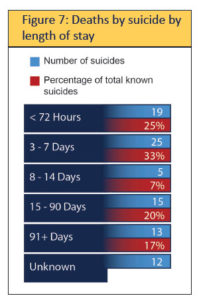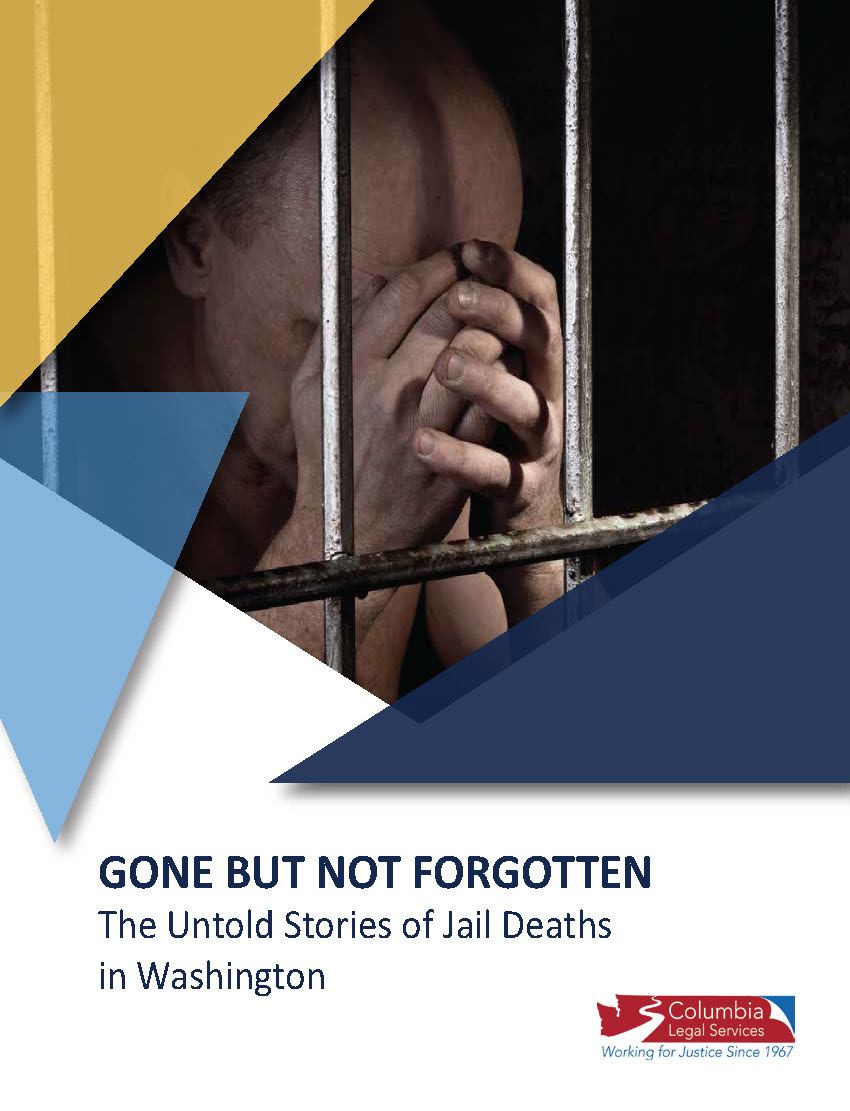Gone But Not Forgotten
Investigation and report uncover the untold stories of people who died in Washington jails.
Criminal Justice Reform – POLICY REFORM
OVERVIEW
Columbia Legal Services undertook a multi-year project to examine all documents related to every death that occurred inside Washington jails from 2005 through June 2016. The investigation culminated in a report, Gone But Not Forgotten: The Untold Stories of Jail Deaths in Washington, which outlines Columbia Legal Services’ findings and includes a number of recommendations.
 Over 200 people died behind bars in Washington’s jails during that period from a variety of causes. However, our review demonstrated that a few particular shortcomings led to many deaths. Alcohol and drugs played a significant role in many deaths, particularly those that occurred within the first few days of booking. A number of people died from overdoses or the effects of poorly managed withdrawal. Others died as a result of failures to treat other serious medical conditions that withdrawal symptoms masked. Many other people died as a result of suicide, while some died following a use of force or serious neglect by jail staff. Many of these deaths could have been avoided.
Over 200 people died behind bars in Washington’s jails during that period from a variety of causes. However, our review demonstrated that a few particular shortcomings led to many deaths. Alcohol and drugs played a significant role in many deaths, particularly those that occurred within the first few days of booking. A number of people died from overdoses or the effects of poorly managed withdrawal. Others died as a result of failures to treat other serious medical conditions that withdrawal symptoms masked. Many other people died as a result of suicide, while some died following a use of force or serious neglect by jail staff. Many of these deaths could have been avoided.
The report contains a number of recommendations that jails and policy makers should adopt; recommendations that will save lives. These include: Reducing the number of people in jails; changing public disclosure laws to require jails to report serious incidents to state agencies and the public; requiring jails to have comprehensive policies and practices relating to withdrawal from drugs and alcohol, suicide prevention, and appropriate uses of force; and ensuring that jails have a sufficient number of trained staff to appropriately care for all people locked behind bars.
For more in-dept details on the data that was uncovered during the investigation please click here.
TEAM



Investigation and Report Uncover the Untold Stories of People Who Died in Washington Jails

Columbia Legal Services undertook a multi-year investigation to examine all documents related to every death that occurred inside Washington jails from 2005 through June 2016, culminating in a report, Gone But Not Forgotten: The Untold Stories of Jail Deaths in Washington, which outlines the findings and includes a number of recommendations.
On any given night, roughly 12,500 men and women sleep behind the walls of county and local jails in Washington. Most of them have not been convicted of a crime but remain in jail because they cannot afford bail. Of those who have been convicted, many are serving short sentences for low-level crimes, most are indigent and many battle substance use disorders, mental illness, or chronic and poorly managed medical conditions. They are not “the other” – over half of all adults in the United States have an immediate family member who has been incarcerated.
“The people in our jails are too often those whom society has ignored and thrown away, people fighting addiction, homelessness, mental illness, ill health, and poverty,” said Nick Straley, an attorney with Columbia Legal Services and author of the report. “Unfortunately, we spend millions of dollars a year warehousing people in our jails – institutions ill-equipped to provide appropriate and adequate care. Far too many people die behind bars as a result.”
Over 200 people died behind bars in Washington’s jails during the period of investigation from a variety of causes. However, the review demonstrated that a few particular shortcomings led to many deaths. Many jails are ill prepared to properly care for people who enter jail under the effects of drugs or alcohol. Unfortunately, people needlessly die as a result. Some die from overdose or poorly managed withdrawal and others as a result of jails’ failures to treat other serious medical conditions that withdrawal symptoms masked. Many people died as a result of suicide, while some died following a use of force or serious neglect by jail staff. Many of these deaths could have been avoided.
The report contains a number of recommendations that jails and policy makers should adopt – recommendations that will save lives. These include reducing the number of people in jails, requiring jails to report serious incidents and have comprehensive policies and practices relating to withdrawal from drugs and alcohol, suicide prevention, and appropriate uses of force, and ensuring that jails have enough trained staff.
“The misdirection of resources to Washington’s jails and away from other more effective and humane, community-based alternatives has caused unnecessary suffering and death,” added Straley. “We hope that shining a light on these concerns and sharing these tragic stories will help spur reform to ensure that no person needlessly dies or suffers behind bars.”
The report explores a few relatively inexpensive reforms that can reduce or eliminate deaths while in custody of Washington jails. Gone But Not Forgotten examines demographic data as well as what charges or convictions people were facing when they died. The report also includes a breakdown of the total deaths and suicides in each Washington county plus the percentage of total bed space being used in that county. The online version of the report features a spreadsheet with more details about the deaths in-custody that were investigated, including the ages and race of each person and descriptions of the events leading to each death.
Columbia Legal Services works with communities to dismantle our racialized criminal justice system and believes that the poor shouldn’t face harsher punishment than the rich. Columbia Legal Services works to ensure that people who are returning home after imprisonment should have a chance to find work, a job, and care for their health and for their families.
